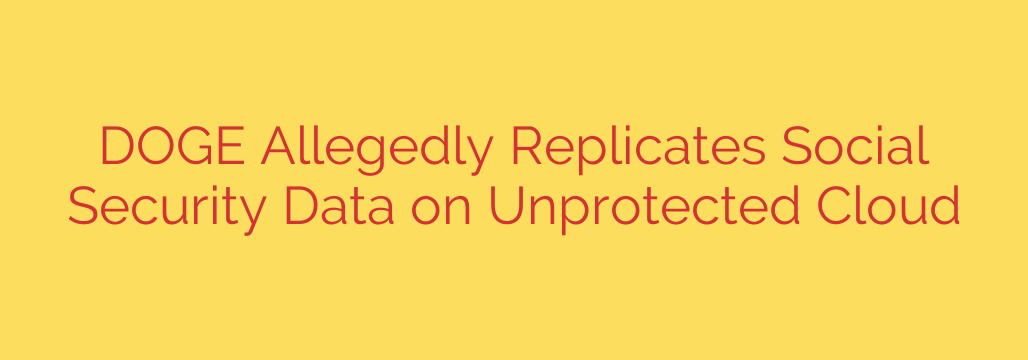
Government Data Breach: Social Security Numbers Exposed on Unprotected Cloud Server
In a significant and alarming cybersecurity lapse, reports have surfaced that a government agency exposed highly sensitive personal data, including Social Security numbers, on an unprotected cloud server. This incident highlights the critical vulnerabilities that can exist within public sector data management and serves as a stark reminder for citizens to remain vigilant about their personal information.
The security failure allegedly occurred when a massive database containing citizen information was replicated and stored in a cloud environment. Crucially, this digital storage location was left without proper security configurations, making it publicly accessible over the internet. This type of exposure is not the result of a sophisticated hack but rather a fundamental error in security protocols—a misconfigured digital door left wide open.
The Alarming Scope of the Data Exposure
While the full extent of the breach is still under investigation, the nature of the exposed information is of grave concern. The data reportedly includes:
- Full Social Security Numbers (SSNs)
- Names and potentially other Personally Identifiable Information (PII)
The exposure of SSNs is particularly dangerous because, unlike a credit card number, a Social Security number is a permanent identifier. Once compromised, it can be used by malicious actors for years to commit various forms of fraud. This incident underscores a critical failure in data governance, where sensitive information was allegedly moved to a less secure environment without the necessary safeguards.
Why This Breach Puts You at Serious Risk
The combination of a name and a Social Security number is a “keys to the kingdom” for identity thieves. With this information, a criminal can potentially:
- Open new lines of credit in your name, such as credit cards and loans.
- File fraudulent tax returns to steal your refund.
- Apply for government benefits under your identity.
- Gain access to your existing financial and medical accounts.
Because this data originates from a government source, it carries a presumed level of authenticity, making it even more valuable on the dark web. The long-term consequences for affected individuals can be devastating, leading to financial loss and a lengthy, difficult process of restoring their identity and credit.
Actionable Security Tips: How to Protect Yourself Now
Whether you believe your data was part of this specific incident or not, it is essential to take proactive steps to secure your identity. Data breaches are becoming increasingly common, and defensive measures are your best line of defense.
Consider a Credit Freeze: This is one of the most effective actions you can take. A credit freeze, also known as a security freeze, restricts access to your credit report, making it much more difficult for identity thieves to open new accounts in your name. You must contact each of the three major credit bureaus (Equifax, Experian, and TransUnion) to place a freeze.
Place a Fraud Alert: A fraud alert is a less restrictive alternative to a freeze. It requires potential creditors to take extra steps to verify your identity before opening a new account. You only need to contact one of the three bureaus to place a fraud alert, and they will notify the other two.
Monitor Your Financial and Credit Statements: Regularly review your bank, credit card, and investment statements for any transactions you don’t recognize. Sign up for transaction alerts from your financial institutions. You are also entitled to a free credit report from each of the three bureaus annually via AnnualCreditReport.com.
Be Wary of Phishing Scams: Scammers often use the news of a data breach to launch targeted phishing campaigns. Be suspicious of any unsolicited emails, texts, or phone calls claiming to be from a government agency asking for your personal information. Government bodies like the IRS and Social Security Administration will not initiate contact this way.
File Your Taxes Early: As soon as you have the necessary documents, file your tax return. This prevents a fraudster from using your stolen SSN to file a fake return and claim your refund.
This incident is a powerful lesson in the importance of adopting robust cybersecurity practices and stringent data handling protocols, especially for government entities entrusted with our most sensitive information. For individuals, the key takeaway is that personal data security is a personal responsibility. Staying informed and taking proactive defensive measures is no longer optional—it’s essential.
Source: https://go.theregister.com/feed/www.theregister.com/2025/08/26/whistleblower_accuses_doge_of_duplicating/








